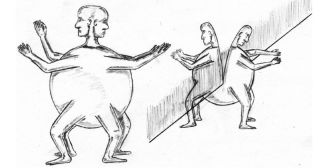Relationships
The Origins of Love
Plato's most beautiful myth.
Updated June 22, 2024 Reviewed by Ekua Hagan

Plato’s Symposium contains a myth about the origins of human love, the Myth of Aristophanes.
In the beginning, there were three kinds of people: male, descended from the sun; female, descended from the earth; and hermaphrodite, with both male and female parts, descended from the moon.
These early people were completely round, each with four arms and four legs, two identical faces on opposite sides of a head with four ears, and all else to match. They walked both forward and backward and ran by turning cartwheels on their eight limbs, moving in circles like their parents the planets.
Because they were wild and unruly and threatening to scale the heavens, Zeus, the father of the gods, cut each one down the middle ‘like a sorb-apple which is halved for pickling’—and even threatened to do the same again so that they might hop on one leg.
Apollo, the god of light and enlightenment, then turned their heads to make them face towards their wound, pulled their skin around to cover up the wound, and tied it together at the navel like a purse. He made sure to leave a few wrinkles on what became known as the abdomen so that they might be reminded of their punishment.
After that, people searched all over for their other half. When they finally found it, they wrapped themselves around it so tightly and unremittingly that they began to die from hunger and neglect. Taking pity on them, Zeus moved their genitals to the front so that those who were previously androgynous could procreate, and those who were previously male could obtain satisfaction and move on to higher things.
This is the origin of our desire for others: those of us who desire members of the opposite sex used to be hermaphrodites, whereas men who desire men used to be male, and women who desire women used to be female.
When we find our other half, we are ‘lost in an amazement of love and friendship and intimacy’ that cannot be accounted for by mere lust, but by the need to be whole again, to be restored to our original nature. Our greatest wish, if we could only have it, would then be for Hephæstus, the god of fire, to melt us into one another so that our souls could be at one and share in a common fate.
Read more in The Gang of Three: Socrates, Plato, Aristotle.
References
Plato, Symposium, The Myth of Aristophanes


